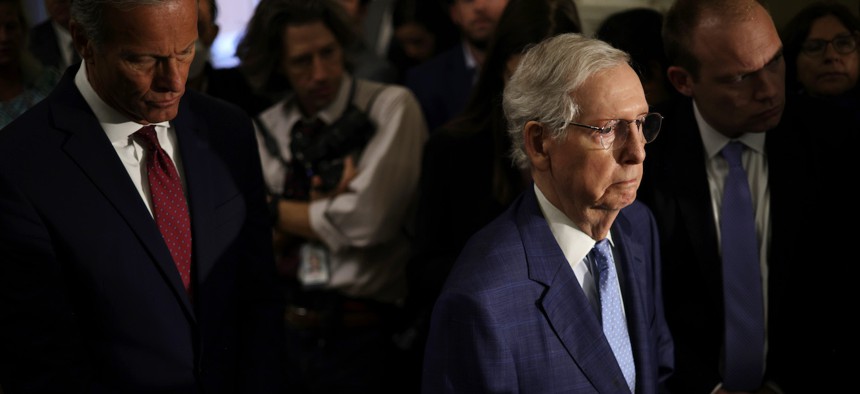
U.S. Senate Minority Leader Mitch McConnell, R-Ky., and Senate Minority Whip Sen. John Thune, R-S.D., listen during a news briefing after a weekly Senate Republican policy luncheon at the U.S. Capitol on Sept. 27, 2023. McConnell is backing the Senate CR and has repeatedly implored his colleagues not to shut down the government. Alex Wong/Getty Images
Senate inches closer toward stopgap passage, though a plan to avoid shutdown remains out of reach
Republicans in the Senate look to assuage House counterparts, but it may already be too late to avert federal employee furloughs in two days.
The Senate on Thursday took another procedural vote to move forward with a stopgap spending bill that would avert a shutdown this weekend, as negotiators in the chamber are working to add a provision to the measure that could make it more palatable for House Republicans.
In a bipartisan, 76-22 vote, the Senate took another step toward advancing its continuing resolution that would keep agencies open through Nov. 17. The bill would provide about $12 billion for Ukraine aid and disaster relief funding and ensure federal firefighters do not experience significant pay cuts.
Senate Majority Leader Chuck Schumer, D-N.Y., said on Thursday the Senate could take its next vote on its CR on Saturday—the last day before current funding expires—or sooner, if lawmakers can agree on a process to speed it up. He noted the bipartisan agreement could still face changes. Absent such an agreement, Senate rules would require a final vote to not take place until after a shutdown has commenced.
“We can speed along this process here in the Senate,” Schumer said. “We can come to an agreement on voting on amendments and allow the Senate to work its will in a timely fashion.”
At least one of those proposed amendments is expected to concern border security, a priority for Republicans that some Democrats could also agree to include. The parameters of such a provision, which would require 60 votes for approval, were still being negotiated Thursday afternoon. The amendment is unlikely to meet House Republicans’ hard-line demands, but the Senate inclusion of such a provision could make the bill more likely to receive a vote in the lower chamber.
House Speaker Kevin McCarthy, R-Calif., has said the Senate stopgap in its current form—meaning without any border policy changes—is dead on arrival in his chamber.
The Biden administration has begun informing federal employees that a shutdown may be looming and agencies are informally notifying their workers who would be furloughed during a lapse and who would be required to report for work. Both sets of employees would only receive paychecks once Congress reopens the government.
Senate Minority Leader Mitch McConnell, R-Ky., who is backing the Senate CR and has repeatedly implored his colleagues not to shut down the government, previewed what could be included in a border amendment.
“I'm encouraged that many of our colleagues who share my concerns are working to ensure that the short-term funding measure we pass this week gives the men and women of Border Patrol and [Immigration and Customs Enforcement] critical resources,” McConnell said from the Senate floor on Thursday.
Schumer, meanwhile, blasted House Republicans for reneging on a deal McCarthy negotiated with President Biden earlier this year to raise the debt ceiling and set spending caps for fiscal 2024. Rather than meet those caps, as the Senate has done with both its full-year appropriations bills and its CR, McCarthy is looking to slash funding below those agreed-upon levels.
“The leaders of the House, the Senate, the White House, we all shook hands on this deal,” Schumer said. “But now the speaker, and only the speaker, is going back on his word.”
The House is looking to pass some of its full-year appropriations bills this week before moving to its own CR on Friday, which is expected to include funding cuts for the duration of the bill and significant border policy changes. That measure would not be able to pass in the Senate, but Republican leaders have said it would give them more leverage for an eventual deal.







